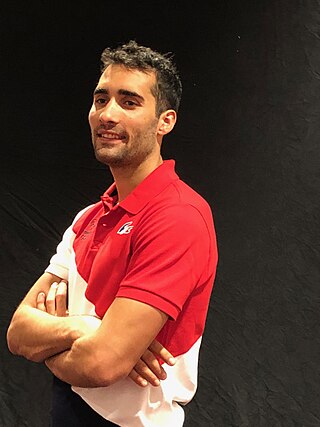
The biathlon is a winter sport that combines cross-country skiing and rifle shooting. It is treated as a race, with contestants skiing through a cross-country trail whose distance is divided into shooting rounds. The shooting rounds are not timed per se, but depending on the competition, missed shots result in extra distance or time being added to the contestant's total.
The 43rd Biathlon World Championships were held in Pyeongchang, South Korea from February 13 to February 22, 2009. It was the first time that the Biathlon World Championships were held in Asia.

Anastasiya Vladimirovna Kuzmina is a Russian-born Slovak biathlete.

Martin Fourcade is a retired French biathlete. He is a six-time Olympic champion, a thirteen-time World Champion and a seven-time winner of the Overall World Cup. As of February 2018, he is the most successful French Winter Olympian of all time. Fourcade is the all-time biathlon record holder of overall World Cup titles with seven big crystal globes and he's also the all-time record holder of the most consecutive Major Championships titles with at least one non-team gold medal in every major championship from 2011 to 2018.

Anton Vladimirovich Shipulin is a retired Russian biathlete and politician serving as the member of the State Duma since 2019.

Anaïs Bescond is a retired French biathlete, olympic champion and world champion. She is also a non-commissioned officer.
The Men's 12.5 kilometre pursuit biathlon competition at the 2002 Winter Olympics was held on 16 February, at Soldier Hollow. Competitors raced over four 2.5 kilometre loops and one 2.75 kilometre loop of the skiing course, shooting four times, twice prone and twice standing. Each miss was penalized by requiring the competitor to race over a 150-metre penalty loop.
The Women's 10 kilometre pursuit biathlon competition at the 2002 Winter Olympics was held on 16 February, at Soldier Hollow. Competitors raced over four 2.5 kilometre loops and one 2.75 kilometre loop of the skiing course, shooting four times, twice prone and twice standing. Each miss was penalized by requiring the competitor to race over a 150-metre penalty loop.
The Women's 7.5 km sprint biathlon competition of the Sochi 2014 Olympics took place at Laura Biathlon & Ski Complex on 9 February 2014. It was won by Anastasiya Kuzmina from Slovakia, who was the defending champion. Olga Vilukhina from Russia won the silver medal, and Vita Semerenko from Ukraine won the bronze. Semerenko had competed in this event at the Olympics but never previously won an Olympic medal.

Laura Dahlmeier is a retired German biathlete. Dahlmeier started in her first world cup races in the 2012/13 season. In 2014, she participated in the Winter Olympics in Sochi. She won a record of five gold medals at the World Championships of 2017. In 2018 she became the first woman to win the biathlon sprint and pursuit in the same Olympics. During her career she has won a total of two golds and one bronze at the Olympics, seven gold medals, three silver medals and five bronze medals at World Championships, one overall World Cup and two discipline World Cup titles. Dahlmeier announced her retirement from competition in May 2019, at the age of 25. In October 2019, she released a children's book.

Justine Braisaz-Bouchet is a French biathlete, Olympic champion in the 12.5 km mass start at the 2022 Beijing Games and medalist at the Winter Olympics 2018 and World Championships.
The women's 7.5 km sprint competition of the Pyeongchang 2018 Olympics was held on 10 February 2018 at the Alpensia Biathlon Centre in Pyeongchang, South Korea.
The women's 12.5 km mass start biathlon competition of the Pyeongchang 2018 Olympics was held on 17 February 2018 at the Alpensia Biathlon Centre in Pyeongchang, South Korea. Anastasiya Kuzmina won the gold medal, the defending champion Darya Domracheva took the silver, and Tiril Eckhoff replicated her 2014 bronze medal success.

Hanna Öberg is a Swedish biathlete who is double Olympic champion and three-time world champion. She is the elder sister of fellow biathlete Elvira Öberg.
The 2018–19 Biathlon World Cup – Pursuit Women started on Sunday 9 December 2018 in Pokljuka and finished on Saturday 23 March 2019 in Holmenkollen. It was won by Dorothea Wierer of Italy, with the defending titlist, Anastasiya Kuzmina of Slovakia, finishing third.
The 2018–19 Biathlon World Cup – Sprint Women started on 8 December 2018 in Pokljuka and finished on 21 March 2019 in Oslo. It was won by the defending titlist, Anastasiya Kuzmina of Slovakia.
The 2019–20 Biathlon World Cup – Sprint Women started on 1 December 2019 in Östersund and will finished on 13 March 2020 in Kontiolahti. The defending champion Anastasiya Kuzmina retired after the 2018-19 season.
The Men's pursuit competition of the Beijing 2022 Olympics was held on 13 February, at the National Biathlon Centre, in the Zhangjiakou cluster of competition venues, 180 kilometres (110 mi) north of Beijing, at an elevation of 1,665 metres (5,463 ft). Quentin Fillon Maillet of France won the event. Tarjei Bø of Norway won the silver medal, and Eduard Latypov, representing the Russian Olympic Committee, won bronze, his first individual Olympic medal.
The Women's pursuit competition of the Beijing 2022 Olympics was held on 13 February, at the National Biathlon Centre, in the Zhangjiakou cluster of competition venues, 180 kilometres (110 mi) north of Beijing, at an elevation of 1,665 metres (5,463 ft). Marte Olsbu Røiseland of Norway won the event. Elvira Öberg of Sweden won the silver medal, and Tiril Eckhoff of Norway the bronze.
The Women's individual competition of the Beijing 2022 Olympics was held on 7 February, at the National Biathlon Centre, in the Zhangjiakou cluster of competition venues, 180 kilometres (110 mi) north of Beijing, at an elevation of 1,665 metres (5,463 ft). The Olympic champion was Denise Herrmann of Germany. Anaïs Chevalier-Bouchet of France won the silver medal, and Marte Olsbu Røiseland of Norway the bronze. For Herrmann and Chevalier-Bouchet it was the first individual Olympic medal.









